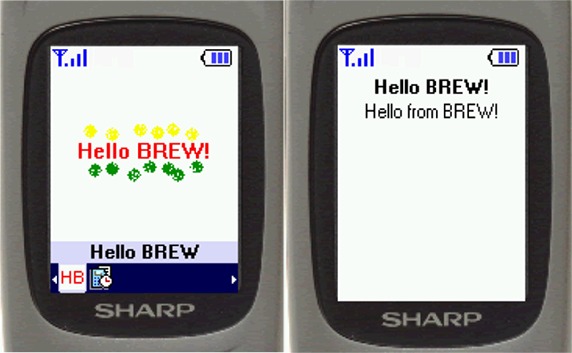/*=========================================================================
FILE: helloworld.c
=========================================================================*/
/*=========================================================================
INCLUDES AND VARIABLE DEFINITIONS
======================================================================== */
#include "AEEModGen.h" // Module interface definitions
#include "AEEAppGen.h" // Applet interface definitions
#include "AEEShell.h" // Shell interface definitions
#include "helloworld.bid"
25
QUALCOMM Proprietary
Writing BREW Applications
/*-------------------------------------------------------------------
Applet structure. All variables in here are reference via "pMe->"
-------------------------------------------------------------------*/
typedef struct _helloworld {
AEEApplet a ; // First element of this structure must be
AEEApplet
AEEDeviceInfo DeviceInfo; // always have access to the hardware device
information
IDisplay *pIDisplay; // give a standard way to access the Display
interface
IShell *pIShell; // give a standard way to access the Shell
interface
// add your own variables here...
} helloworld;
/*-------------------------------------------------------------------
Function Prototypes
-------------------------------------------------------------------*/
static boolean helloworld_HandleEvent(helloworld* pMe, AEEEvent eCode,
uint16 wParam, uint32 dwParam);
boolean helloworld_InitAppData(helloworld* pMe);
void helloworld_FreeAppData(helloworld* pMe);
/*=========================================================================
FUNCTION DEFINITIONS
======================================================================== */
/*=========================================================================
FUNCTION: AEEClsCreateInstance
=========================================================================*/
int AEEClsCreateInstance(AEECLSID ClsId, IShell *pIShell, IModule *po, void **ppObj)
{
*ppObj = NULL;
if( ClsId == AEECLSID_HELLOWORLD )
{
// Create the applet and make room for the applet structure
if( AEEApplet_New(sizeof(helloworld),
ClsId,
pIShell,
po,
26
QUALCOMM Proprietary
Writing BREW Applications
(IApplet**)ppObj,
(AEEHANDLER)helloworld_HandleEvent,
(PFNFREEAPPDATA)helloworld_FreeAppData) )
// the FreeAppData function is called after sending EVT_APP_STOP to the HandleEvent
// function
{
//Initialize applet data, this is called before sending EVT_APP_START
// to the HandleEvent function
if(helloworld_InitAppData((helloworld*)*ppObj))
{
//Data initialized successfully
return(AEE_SUCCESS);
}
else
{
//Release the applet. This will free the memory allocated for the applet when
// AEEApplet_New was called.
IAPPLET_Release((IApplet*)*ppObj);
return EFAILED;
}
} // end AEEApplet_New
return(EFAILED);
}
/*=========================================================================
FUNCTION SampleAppWizard_HandleEvent
=========================================================================*/
static boolean helloworld_HandleEvent(helloworld* pMe, AEEEvent eCode,
uint16 wParam, uint32 dwParam)
{
switch (eCode)
{
// App is told it is starting up
case EVT_APP_START:
// Add your code here...
return(TRUE);
// App is told it is exiting
case EVT_APP_STOP:
27
QUALCOMM Proprietary
Writing BREW Applications
// Add your code here...
return(TRUE);
// App is being suspended
case EVT_APP_SUSPEND:
// Add your code here...
return(TRUE);
// App is being resumed
case EVT_APP_RESUME:
// Add your code here...
return(TRUE);
// An SMS message has arrived for this app. Message is in the
// dwParam above as (char *)
// sender simply uses this format "//BREW:ClassId:Message", example
//BREW:0x00000001:Hello World
case EVT_APP_MESSAGE:
// Add your code here...
return(TRUE);
// A key was pressed. Look at the wParam above to see which key was pressed.
// The key codes are in AEEVCodes.h.
// Example "AVK_1" means that the "1" key was pressed.
case EVT_KEY:
// Add your code here...
return(TRUE);
// If nothing fits up to this point then we'll just break out
default:
break;
}
return FALSE;
}
// this function is called when your application is starting up
boolean helloworld_InitAppData(helloworld* pMe)
{
// Get the device information for this handset.
28
QUALCOMM Proprietary
Writing BREW Applications
// Reference all the data by looking at the pMe->DeviceInfo structure
// Check the API reference guide for all the handy device info you can get
pMe->DeviceInfo.wStructSize = sizeof(pMe->DeviceInfo);
ISHELL_GetDeviceInfo(pMe->a.m_pIShell,&pMe->DeviceInfo);
// The display and shell interfaces are always created by
// default, so we'll asign them so that you can access
// them via the standard "pMe->" without the "a."
pMe->pIDisplay = pMe->a.m_pIDisplay;
pMe->pIShell = pMe->a.m_pIShell;
// Insert your code here for initializing or allocating resources...
// if there have been no failures up to this point then return success
return TRUE;
}
// this function is called when your application is exiting
void helloworld_FreeAppData(helloworld* pMe)
{
// insert your code here for freeing any resources you have allocated...
// example to use for releasing each interface:
// if ( pMe->pIMenuCtl != NULL ) // check for NULL first
// {
// IMENUCTL_Release(pMe->pIMenuCtl) // release the interface
// pMe->pIMenuCtl = NULL; // set to NULL so no problems trying to free later
}
}
|

